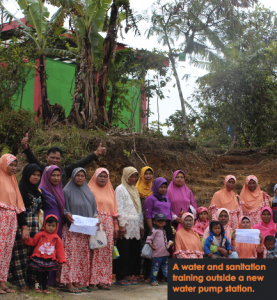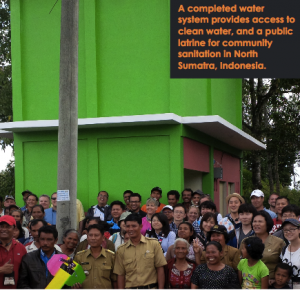Project activities included mobilizing water management committees (WMC), developing community water management plans, designing water systems, constructing and maintaining water systems, developing outreach strategies and training materials, and conducting outreach and training in local schools, community centers and clinics.
Impact: Sustainable Solutions
 How does a foreign organization keep construction projects sustainable? For NCBA CLUSA, the key is community organizations. At every point in the process the community is mobilizing themselves to construct, plan, and fix the water systems.
How does a foreign organization keep construction projects sustainable? For NCBA CLUSA, the key is community organizations. At every point in the process the community is mobilizing themselves to construct, plan, and fix the water systems.
The development of water management committees (WMCs) was one of the first steps in introducing the CoopWASH program to a community. The committees organize labor during the construction phase, and then maintain the systems once they are built.
Water projects often fail because communities are technically or financially unequipped to maintain complex infrastructure, but the only ongoing maintenance CoopWASH systems require is cleaning the spigots and ensuring good drainage to avoid standing water.
The whole process begins with developing water groups with democratically elected management committees. Once these committees are established, NCBA CLUSA staff, through our implementing parters and coffee co-ops on the ground, work with them to prepare management plans.
 An important aspect of these plans is separating household water uses from coffee pulping and ensuring that the pulp is composted and properly disposed. Lack of accessible, clean water compromises coffee quality in Indonesia. Much of the coffee grown in Sumatra is pulped at the village level and sold in a “wet hulled” state. Farmers who don’t have access to clean water recycle the water they need for pulping, leading to bacterial contamination of the hulled coffee and off-flavors.
An important aspect of these plans is separating household water uses from coffee pulping and ensuring that the pulp is composted and properly disposed. Lack of accessible, clean water compromises coffee quality in Indonesia. Much of the coffee grown in Sumatra is pulped at the village level and sold in a “wet hulled” state. Farmers who don’t have access to clean water recycle the water they need for pulping, leading to bacterial contamination of the hulled coffee and off-flavors.
Beyond coffee, clean water is important for daily life. Before CoopWASH began, all the households in the villages collected their drinking and washing water from streams and unprotected drainage ditches. But simply having access to clean water does not fix all the risk of disease. Sanitation starts with access, but also involves training and use.
After the water systems have been built, the committees begin training the community on proper sanitation practices, such as hand washing, and hygiene.

